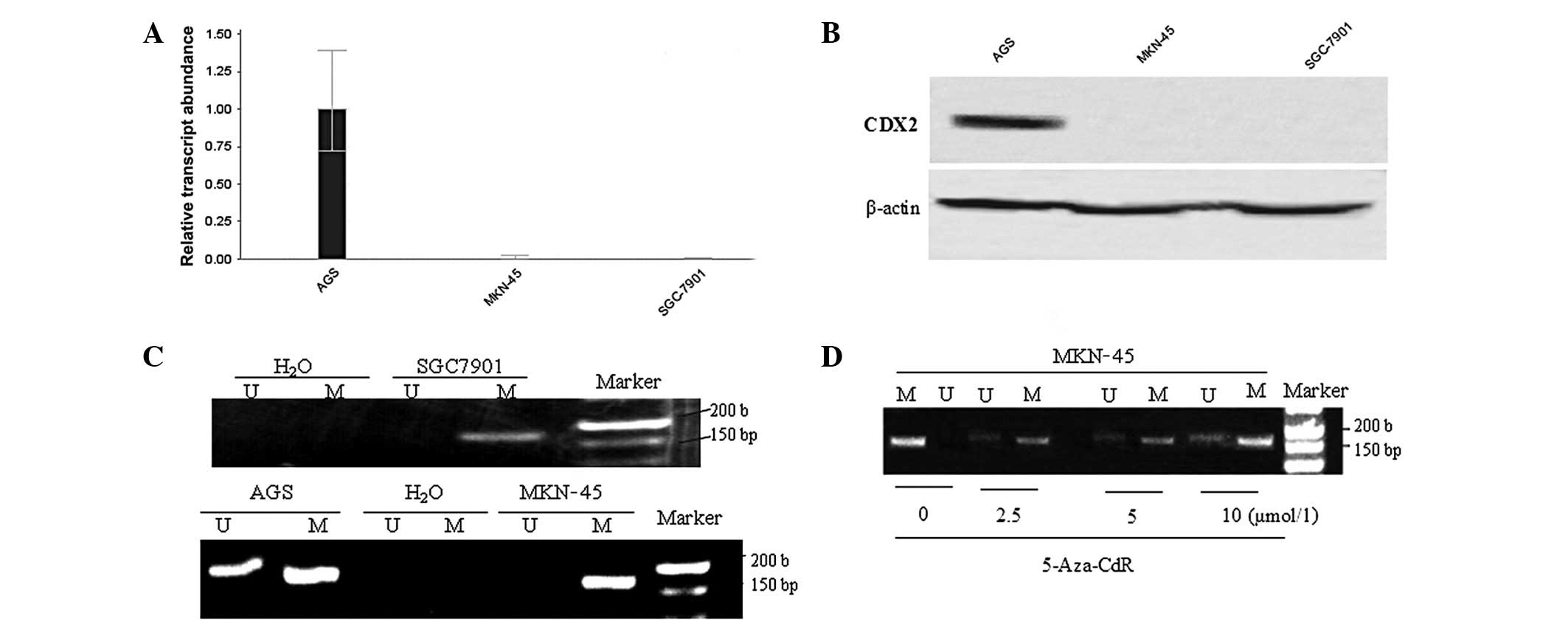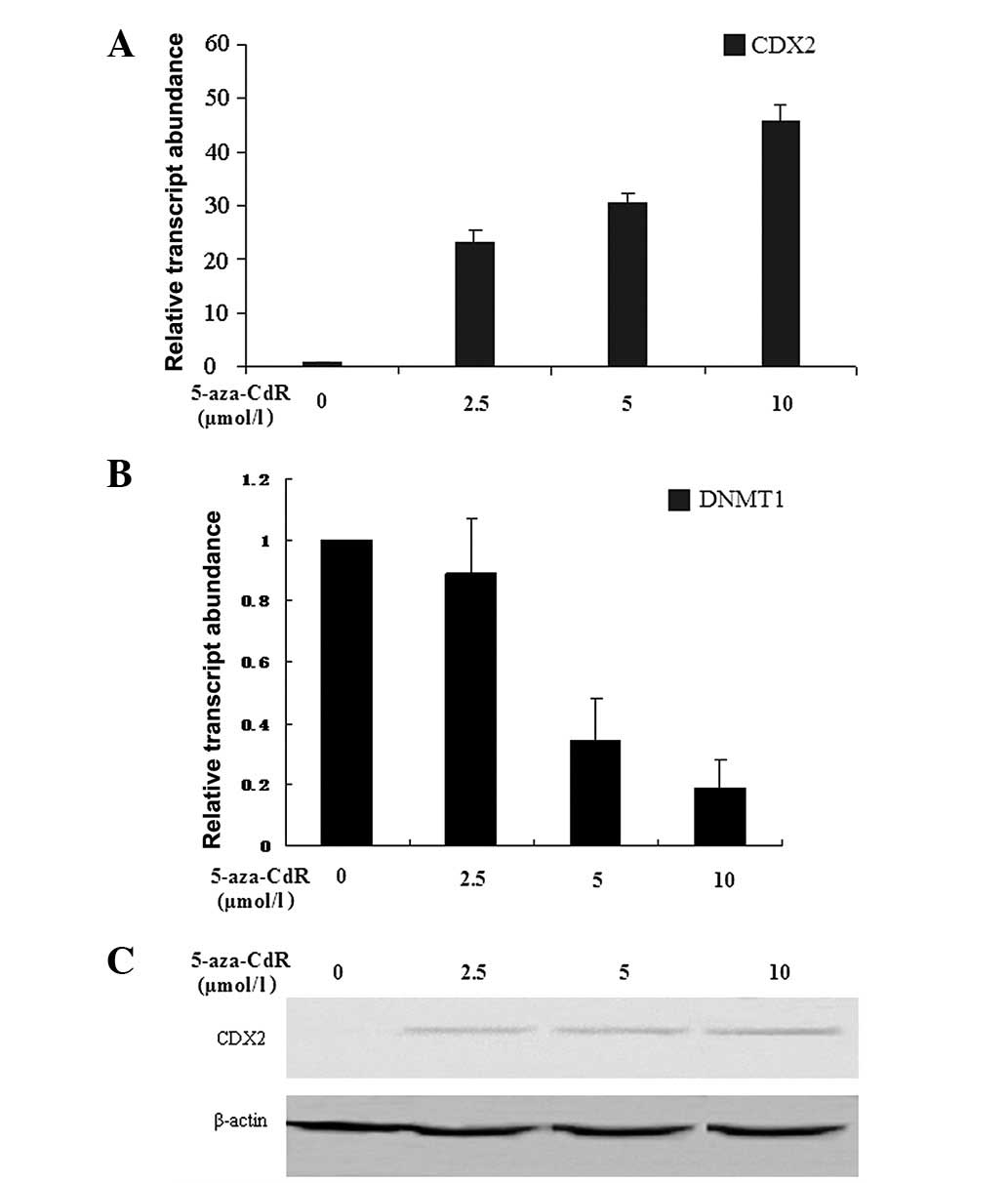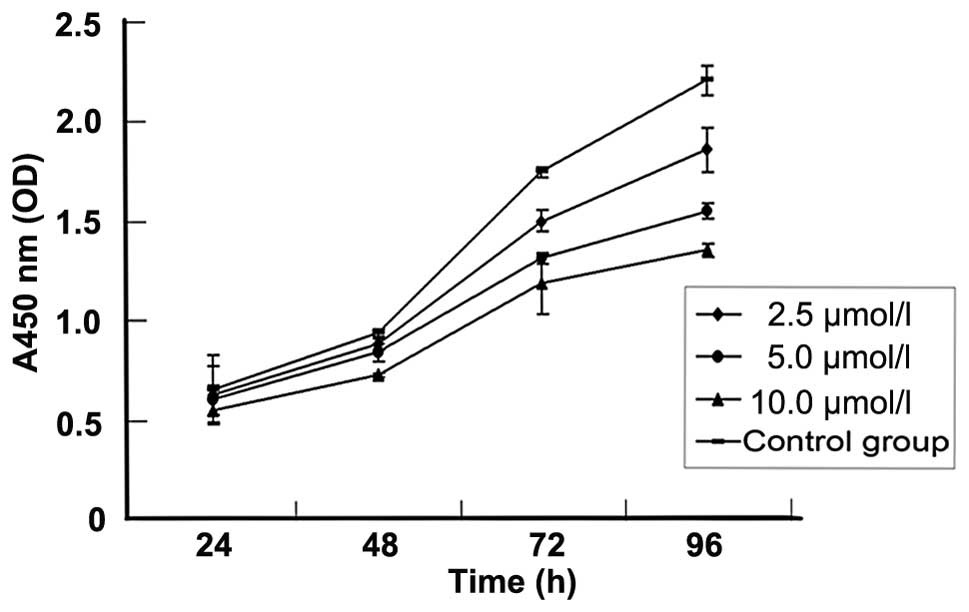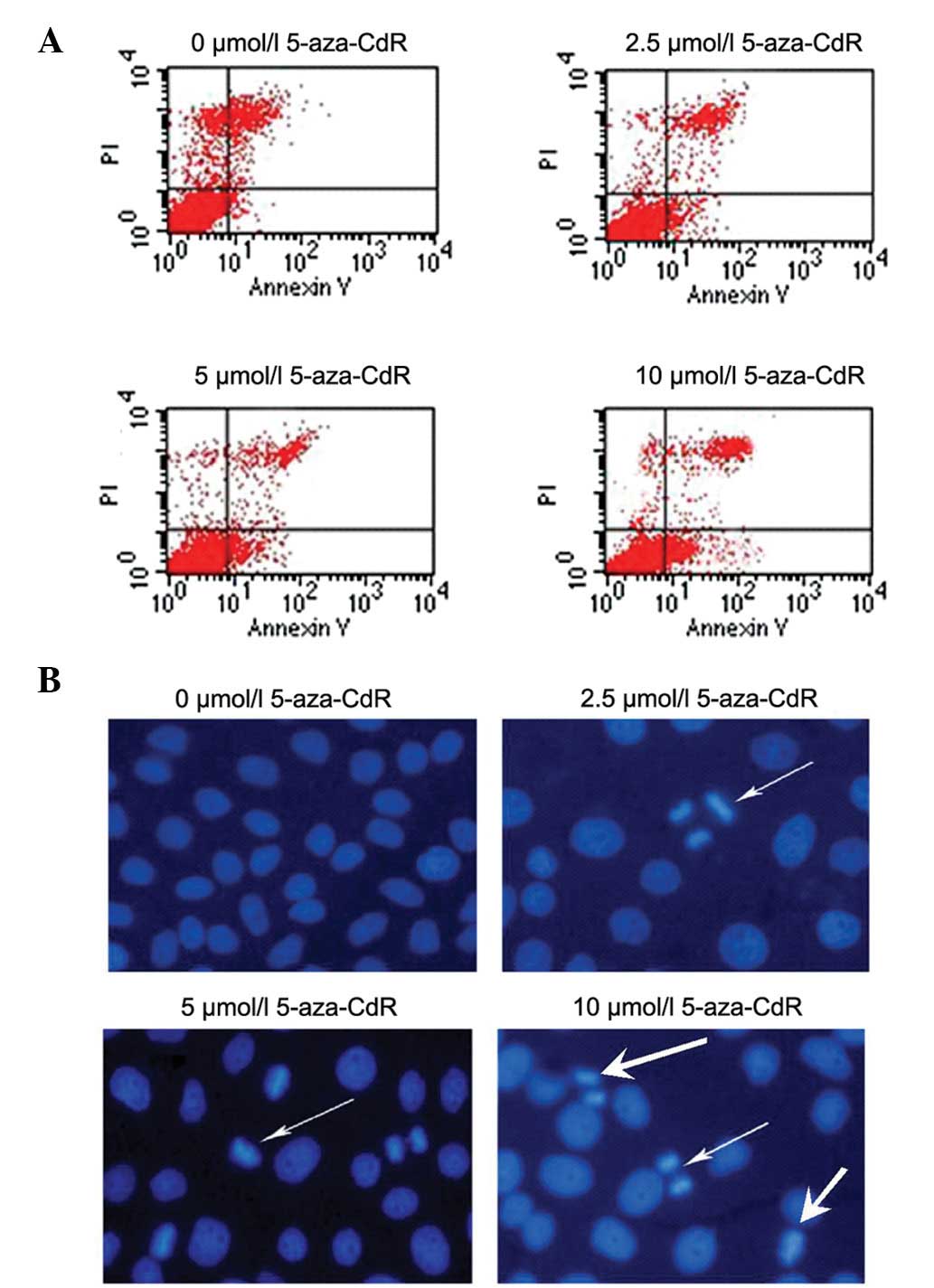|
1.
|
Parkin DM, Bray F, Ferlay J and Pisani P:
Global cancer statistics, 2002. CA Cancer J Clin. 55:74–108. 2005.
View Article : Google Scholar
|
|
2.
|
Leung WK, Wu MS, Kakugawa Y, et al:
Screening for gastric cancer in Asia: current evidence and
practice. Lancet Oncol. 9:279–287. 2008. View Article : Google Scholar : PubMed/NCBI
|
|
3.
|
Bird A: Perceptions of epigenetics.
Nature. 447:396–398. 2007. View Article : Google Scholar : PubMed/NCBI
|
|
4.
|
Jones PA and Baylin SB: The epigenomics of
cancer. Cell. 128:683–692. 2007. View Article : Google Scholar : PubMed/NCBI
|
|
5.
|
Turek-Plewa J and Jagodziński PP: The role
of mammalian DNA methyltransferases in the regulation of gene
expression. Cell Mol Biol Lett. 10:631–647. 2005.PubMed/NCBI
|
|
6.
|
Mizuno S, Chijiwa T, Okamura T, et al:
Expression of DNA methyltransferases DNMT1, 3A, and 3B in normal
hematopoiesis and in acute and chronic myelogenous leukemia. Blood.
97:1172–1179. 2001. View Article : Google Scholar : PubMed/NCBI
|
|
7.
|
Lyko F and Brown R: DNA methyltransferase
inhibitors and the development of epigenetic cancer therapies. J
Natl Cancer Inst. 97:1498–1506. 2005. View Article : Google Scholar : PubMed/NCBI
|
|
8.
|
Silberg DG, Swain GP, Suh ER and Traber
PG: Cdx1 and cdx2 expression during intestinal development.
Gastroenterology. 119:961–971. 2000. View Article : Google Scholar : PubMed/NCBI
|
|
9.
|
Almeida R, Silva E, Santos-Silva F, et al:
Expression of intestine-specific transcription factors, CDX1 and
CDX2, in intestinal metaplasia and gastric carcinomas. J Pathol.
199:36–40. 2003. View Article : Google Scholar : PubMed/NCBI
|
|
10.
|
Kang JM, Lee BH, Kim N, et al: CDX1 and
CDX2 expression in intestinal metaplasia, dysplasia and gastric
cancer. J Korean Med Sci. 26:647–653. 2011. View Article : Google Scholar : PubMed/NCBI
|
|
11.
|
Freund JN, Domon-Dell C, Kedinger M and
Duluc I: The Cdx-1 and Cdx-2 homeobox genes in the intestine.
Biochem Cell Biol. 76:957–969. 1998. View Article : Google Scholar : PubMed/NCBI
|
|
12.
|
Baba Y, Nosho K, Shima K, et al:
Relationship of CDX2 loss with molecular features and prognosis in
colorectal cancer. Clin Cancer Res. 15:4665–4673. 2009. View Article : Google Scholar : PubMed/NCBI
|
|
13.
|
Mallo GV, Rechreche H, Frigerio JM, et al:
Molecular cloning, sequencing and expression of the mRNA encoding
human Cdx1 and Cdx2 homeobox. Down-regulation of Cdx1 and Cdx2 mRNA
expression during colorectal carcinogenesis. Int J Cancer.
74:35–44. 1997. View Article : Google Scholar : PubMed/NCBI
|
|
14.
|
Vider BZ, Zimber A, Hirsch D, et al: Human
colorectal carcinogenesis is associated with deregulation of
homeobox gene expression. Biochem Biophys Res Commun. 232:742–748.
1997. View Article : Google Scholar : PubMed/NCBI
|
|
15.
|
Park do Y, Srivastava A, Kim GH, et al:
CDX2 expression in the intestinal-type gastric epithelial
neoplasia: frequency and significance. Mod Pathol. 23:54–61.
2010.PubMed/NCBI
|
|
16.
|
Saad RS, Ghorab Z, Khalifa MA and Xu M:
CDX2 as a marker for intestinal differentiation: Its utility and
limitations. World J Gastrointest Surg. 3:159–166. 2011. View Article : Google Scholar : PubMed/NCBI
|
|
17.
|
Washington K: 7th edition of the AJCC
cancer staging manual: stomach. Ann Surg Oncol. 17:3077–3079. 2010.
View Article : Google Scholar : PubMed/NCBI
|
|
18.
|
Livak KJ and Schmittgen TD: Analysis of
relative gene expression data using real-time quantitative PCR and
the 2(-Delta Delta C(T)) method. Methods. 25:402–408. 2001.
View Article : Google Scholar : PubMed/NCBI
|
|
19.
|
Mao ZB, Zhang JF, Xu Z, et al: Ectopic
expression of guanylyl cyclase C in gastric cancer as a potential
biomarker and therapeutic target. J Dig Dis. 10:272–285. 2009.
View Article : Google Scholar : PubMed/NCBI
|
|
20.
|
Herman JG, Graff JR, Myöhänen S, et al:
Methylation-specific PCR: a novel PCR assay for methylation status
of CpG islands. Proc Natl Acad Sci USA. 93:9821–9826. 1996.
View Article : Google Scholar : PubMed/NCBI
|
|
21.
|
Yuasa Y, Nagasaki H, Akiyama Y, et al: DNA
methylation status is inversely correlated with green tea intake
and physical activity in gastric cancer patients. Int J Cancer.
124:2677–2682. 2009. View Article : Google Scholar : PubMed/NCBI
|
|
22.
|
Hanahan D and Weinberg RA: The hallmarks
of cancer. Cell. 100:57–70. 2000. View Article : Google Scholar
|
|
23.
|
Hanahan D and Weinberg RA: Hallmarks of
cancer: the next generation. Cell. 144:646–674. 2011. View Article : Google Scholar : PubMed/NCBI
|
|
24.
|
Walters JR, Howard A, Rumble HE, et al:
Differences in expression of homeobox transcription factors in
proximal and distal human small intestine. Gastroenterology.
113:472–477. 1997. View Article : Google Scholar : PubMed/NCBI
|
|
25.
|
Tamai Y, Nakajima R, Ishikawa T, et al:
Colonic hamartoma development by anomalous duplication in Cdx2
knockout mice. Cancer Res. 59:2965–2970. 1999.PubMed/NCBI
|
|
26.
|
Beck F, Chawengsaksophak K, Waring P, et
al: Reprogramming of intestinal differentiation and intercalary
regeneration in Cdx2 mutant mice. Proc Natl Acad Sci USA.
96:7318–7323. 1999. View Article : Google Scholar : PubMed/NCBI
|
|
27.
|
Barbareschi M, Murer B, Colby TV, et al:
CDX-2 homeobox gene expression is a reliable marker of colorectal
adenocarcinoma metastases to the lungs. Am J Surg Pathol.
27:141–149. 2003. View Article : Google Scholar : PubMed/NCBI
|
|
28.
|
Werling RW, Yaziji H, Bacchi CE, et al:
CDX2, a highly sensitive and specific marker of adenocarcinomas of
intestinal origin: an immunohistochemical survey of 476 primary and
metastatic carcinomas. Am J Surg Pathol. 27:303–310. 2003.
View Article : Google Scholar
|
|
29.
|
Moskaluk CA, Zhang H, Powell SM, et al:
Cdx2 protein expression in normal and malignant human tissues: an
immunohistochemical survey using tissue microarrays. Mod Pathol.
16:913–919. 2003. View Article : Google Scholar : PubMed/NCBI
|
|
30.
|
Kaimaktchiev V, Terracciano L, Tornillo L,
et al: The homeobox intestinal differentiation factor CDX2 is
selectively expressed in gastrointestinal adenocarcinomas. Mod
Pathol. 17:1392–1399. 2004. View Article : Google Scholar
|
|
31.
|
Seno H, Oshima M, Taniguchi MA, et al:
CDX2 expression in the stomach with intestinal metaplasia and
intestinal-type cancer: Prognostic implications. Int J Oncol.
21:769–774. 2002.PubMed/NCBI
|
|
32.
|
Mizoshita T, Tsukamoto T, Nakanishi H, et
al: Expression of Cdx2 and the phenotype of advanced gastric
cancers: relationship with prognosis. J Cancer Res Clin Oncol.
129:727–734. 2003. View Article : Google Scholar : PubMed/NCBI
|
|
33.
|
Fan Z, Li J, Dong B and Huang X:
Expression of Cdx2 and hepatocyte antigen in gastric carcinoma:
correlation with histologic type and implications for prognosis.
Clin Cancer Res. 11:6162–6170. 2005. View Article : Google Scholar : PubMed/NCBI
|
|
34.
|
Liu Q, Teh M, Ito K, et al: CDX2
expression is progressively decreased in human gastric intestinal
metaplasia, dysplasia and cancer. Mod Pathol. 20:1286–1297. 2007.
View Article : Google Scholar : PubMed/NCBI
|
|
35.
|
Song JH, Kim CJ, Cho YG, et al: Genetic
alterations of the Cdx2 gene in gastric cancer. APMIS. 116:74–80.
2008. View Article : Google Scholar : PubMed/NCBI
|
|
36.
|
Okayama H, Kumamoto K, Saitou K, et al:
CD44v6, MMP-7 and nuclear Cdx2 are significant biomarkers for
prediction of lymph node metastasis in primary gastric cancer.
Oncol Rep. 22:745–755. 2009.PubMed/NCBI
|
|
37.
|
Qin R, Wang NN, Chu J, et al: Expression
and significance of homeodomain protein Cdx2 in gastric carcinoma
and precancerous lesions. World J Gastroenterol. 18:3296–3302.
2012.PubMed/NCBI
|
|
38.
|
Xie Y, Li L, Wang X, et al: Overexpression
of Cdx2 inhibits progression of gastric cancer in vitro. Int J
Oncol. 36:509–516. 2010.PubMed/NCBI
|
|
39.
|
Ding WJ, Fang JY, Chen XY and Peng YS: The
expression and clinical significance of DNA methyltransferase
proteins in human gastric cancer. Dig Dis Sci. 53:2083–2089. 2008.
View Article : Google Scholar : PubMed/NCBI
|
|
40.
|
Sharma S, Kelly TK and Jones PA:
Epigenetics in cancer. Carcinogenesis. 31:27–36. 2010. View Article : Google Scholar
|
|
41.
|
Gilbert J, Gore SD, Herman JG and Garducci
MA: The clinical application of targeting cancer through histone
acetylation and hypomethylation. Clin Cancer Res. 10:4589–4596.
2004. View Article : Google Scholar : PubMed/NCBI
|
|
42.
|
Susin SA, Daugas E, Ravagnan L, et al: Two
distinct pathways leading to nuclear apoptosis. J Exp Med.
192:571–580. 2000. View Article : Google Scholar : PubMed/NCBI
|
|
43.
|
Wang X, Zhu S, Drozda M, et al:
Minocycline inhibits caspase-independent and -dependent
mitochondrial cell death pathways in models of Huntington’s
disease. Proc Natl Acad Sci USA. 100:10483–10487. 2003.PubMed/NCBI
|
|
44.
|
Antonsson B: Mitochondria and the Bcl-2
family proteins in apoptosis signaling pathways. Mol Cell Biochem.
256–257:141–155. 2004.PubMed/NCBI
|
|
45.
|
Stefanis L: Caspase-dependent and
-independent neuronal death: two distinct pathways to neuronal
injury. Neuroscientist. 11:50–62. 2005. View Article : Google Scholar : PubMed/NCBI
|


















